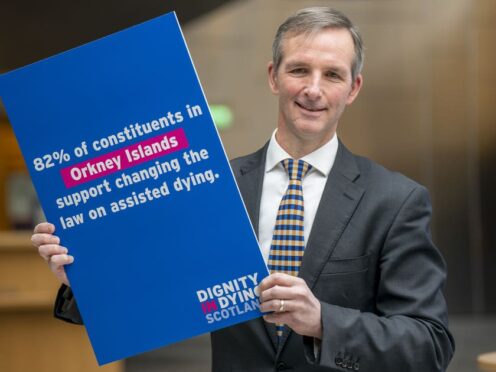
The MSP behind proposed legislation to introduce assisted dying for terminally ill people in Scotland has said he is open to discussions around raising the age limit for it.
Liam McArthur’s Assisted Dying for Terminally Ill Adults (Scotland) Bill was published on Thursday, becoming the third attempt at changing the law on the issue since devolution.
The Lib Dem MSP has said he is “confident” the Scottish Parliament will back his legislation when it comes to a vote, adding “robust safeguards” are included in the Bill.
Speaking to The Steamie, the politics podcast by The Scotsman newspaper, Mr McArthur was asked if 16 is too young for a terminally ill person to make such a decision.
He said: “I think there will need to be a genuine debate around this.
“I opted for 16 in my Bill – age of majority – but I fully expect this to be an area that the lead committee taking evidence will want to scrutinise.
“I’ve had discussions with different stakeholder organisations, including CHAS (Children’s Hospices Across Scotland), who I know have concerns about age limits.
“So I’m open to having those discussions. I need to understand the nature of the concerns and how they might be addressed.”
Changing the law will lead to more “open, regulated and safeguarded discussions around how we die”, he said.
Mr McArthur’s Bill would give people over the age of 16 with an advanced terminal illness the option of requesting an assisted death.
They would need to have the mental capacity to make such a request, which would have to be made voluntarily.

Two doctors would have to be satisfied about the patient’s condition, and also that they have not been pressurised into their decision.
Only people who have lived in Scotland for at least a year would be allowed to make such a request, which would be followed by a mandatory 14-day “reflection period”.
Holyrood will likely vote on the general principles of the Bill later this year and MSPs are expected to be given a free vote.
However, the leaders of Scotland’s three largest parties – Humza Yousaf, Douglas Ross and Anas Sarwar – have all said they are not currently minded to support the Bill.
Opponents of the legislation have said they fear it would see the lives of people who are ill or disabled being “devalued”, with the Bishop of Paisley John Keenan branding it a “dangerous idea”.

Enjoy the convenience of having The Sunday Post delivered as a digital ePaper straight to your smartphone, tablet or computer.
Subscribe for only £5.49 a month and enjoy all the benefits of the printed paper as a digital replica.
Subscribe